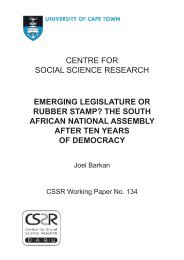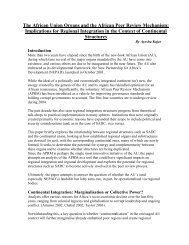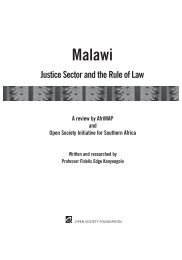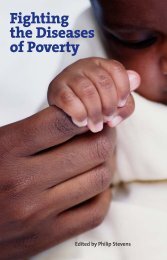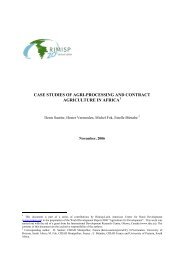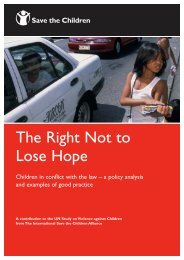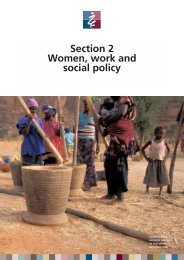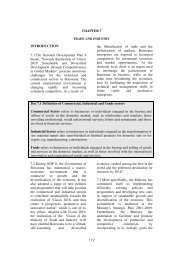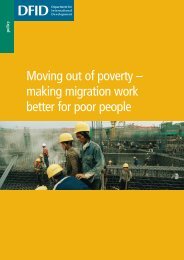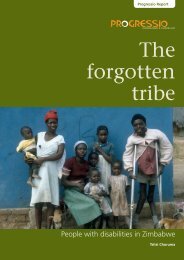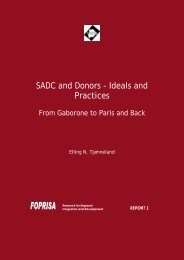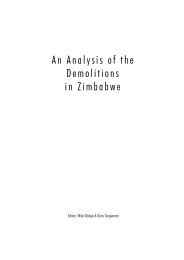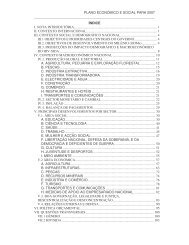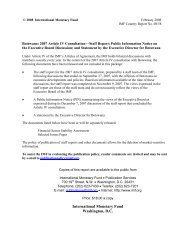Report of the National Conference: Women's Property Rights ... - FAO
Report of the National Conference: Women's Property Rights ... - FAO
Report of the National Conference: Women's Property Rights ... - FAO
You also want an ePaper? Increase the reach of your titles
YUMPU automatically turns print PDFs into web optimized ePapers that Google loves.
justice <strong>of</strong> women’s rights and particular those women who have suffered discriminationas a consequence <strong>of</strong> <strong>the</strong> HIV and AIDS pandemic. In general, issues discussed at <strong>the</strong>workshop were complex and difficult through out <strong>the</strong> world. Their complexity accordingto Robin Palmer, stems from <strong>the</strong> fact that <strong>the</strong>y operate at different levels and thus requireresponses at different levels. The most critical level being <strong>the</strong> household and also at <strong>the</strong>level <strong>of</strong> ‘traditional institutions’.The women’s fight over land and property rights has been observed across <strong>the</strong> world.Despite <strong>the</strong> resistance confronted by women, successes have been recorded in parts <strong>of</strong>India and Latin America. At independence in 1947, successful pressure for gender equityin inheritance law in India brought successful results. Likewise, a relatively enlightenedlegal tradition in Latin America enabled many women to acquire land throughinheritance. South Africa and Brazil have also enacted new gender sensitive constitutionsthat protect <strong>the</strong> rights <strong>of</strong> women. Apart from Africa lagging behind Latin America andAsia in terms <strong>of</strong> social and political mobilisation, it also suffers from <strong>the</strong> impacts <strong>of</strong> <strong>the</strong>HIV and AIDS pandemic. Problems in Africa have been exacerbated by <strong>the</strong> fact thatwomen’s and men’s interests within marriage and households are both joint and separate.In most cases, such arrangements have resulted in discrimination and injustices for manywomen.This workshop was building on <strong>the</strong> lessons learnt from <strong>the</strong> <strong>FAO</strong>/Oxfam workshop on“Women’s Land <strong>Rights</strong> in sou<strong>the</strong>rn and eastern Africa” held in Pretoria 2003. ThePretoria workshop emphasised among o<strong>the</strong>r things, <strong>the</strong> need to continue building amovement, sharing experiences and documenting best practices. Zambia created a goodenvironment for such initiatives because <strong>of</strong> a tolerant political tradition and peace that hasexisted for over 40 years and <strong>the</strong>se needed to be treasured and preserved.Kaori Izumi though still recovering from an operation, shared her passion on women,land and property rights by narrating a recent case <strong>of</strong> a Zimbabwean widow who waskilled by her stepson over property. Women and children were <strong>the</strong> most vulnerableespecially in <strong>the</strong> face <strong>of</strong> HIV and AIDS. However, HIV and AIDS also provided anopportunity for exposing discriminatory laws and practices existing in <strong>the</strong> region. Manychanges are happening and issues affecting women are slowly being understood but inreality women continue to suffer. Dr. Izumi expressed how she has over <strong>the</strong> years visitedmany countries in <strong>the</strong> region and witnessed lots <strong>of</strong> suffering by women, especiallywidows affected/infected by HIV and AIDS. Despite such scenarios, organisations wereresponding to <strong>the</strong> crisis with minimum resources and support. Building <strong>the</strong> resilience <strong>of</strong>women in <strong>the</strong> region required that basic support be provided at <strong>the</strong> right time. A number<strong>of</strong> women have been lost in <strong>the</strong> region as a result <strong>of</strong> trauma, poverty and worseninghealth.<strong>Property</strong> grabbing can be invisible and not recognised through statistics, especially <strong>of</strong>children and orphans. Many organisations were failing to reach <strong>the</strong>se people due to lack<strong>of</strong> appropriate procedures. HIV and AIDS provided an opportunity to address an issuethat has grown into an emergency. Dr. Izumi challenged everyone to find answers to whatdrives people to grab property.7



